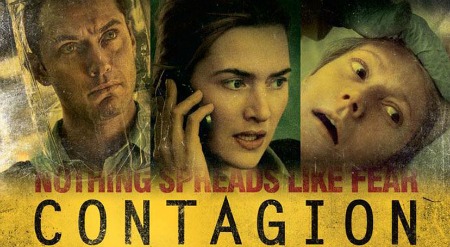
Vice-dean of research David Evans
A new virus threatening the human population and spreading swiftly across the globe, leaving death, destruction and full blown panic: This frightening scenario makes for the perfect thrilling movie... but just how realistic is it?
Join U of A virologist and Faculty of Medicine & Dentistry's vice-dean of research David Evans at the Garneau Theatre this Thursday, Oct. 13 at 6:30 p.m. for a free screening of Contagion to find out.
As part of the Science in the Cinema screening, after enjoying the film and filling up on free popcorn, audience members have the chance to sift through what is cinematic sensationalism or scientifically sound with a panel of experts including Evans, Eric Bone, director, zone operations for emergency and disaster management at Alberta Health Services and Lynora Saxinger, U of A associate professor of infectious disease.
Epidemics: Hollywood versus real life
According to Evans, the typical script for a classic cinematic treatment of infectious disease plays out as follows: "Disease pops up from somewhere. It starts to kill people in horrible ways creating a worldwide panic and destruction with tanks and helicopters. A brilliant researcher, fighting with the powers that be, goes in to deal with it. Someone they care about, usually their child or a friend, is sick and dying. Wearing the spacesuit, they bravely discover a magical cure. In just a couple of days, they save the world."
His main issue with how outbreak movies depict infectious diseases is how quickly scientists are able to move from discovery in the lab to medicine in a bottle, with vaccines shipped worldwide in what seems like a matter of minutes. But real epidemics such as influenzas, HIV and Hepatitis C, could sneak up on you.
"It can take a while before people start to put two and two together to recognize there is a new agent there. With Hepatitis C, it took 15 years before researchers identified what it was. "It took a decade before they realized it was blood borne," explains Evans.
Evans says the really dangerous viruses are the ones that don't have any immediate symptoms but are still infectious, like untreated HIV. "People are infected but they don't feel particularly ill. They start to go into a slow period of decline as their immune system is ravaged but they remain infectious that whole time," he adds.
Evans commends Steven Soderbergh's Contagion, featuring a star studded cast including Matt Damon, Jude Law, Kate Winslet, Gwyneth Paltrow and Laurence Fishburne, for taking the scientific method into account.
What rings the most true for Evans with Contagion and other theatrical treatments of infectious disease is the chaos caused when you get an epidemic.
"If you had a real epidemic, let's say a smallpox or ebola outbreak in North America, you would really have a mess on your hands before it came under control. All the food networks in cities would be shut down. All the truck drivers would have to stop delivering food. All the power systems and water systems would start to get into trouble. You would have a real problem."

Evans points to the 2003 outbreak of SARS (severe acute respiratory syndrome) in Toronto as an example. "That virus was spreading fast, had it not been brought under control, people were seriously discussing the imposition of the quarantine act across the city. It was that serious.That's what a real epidemic can look like and it is very scary."
"Science can be very dramatic and exciting. Movies can help to transfer that excitement," says Evans. "Science in the Cinema is an opportunity to connect some of our medical doctors and researchers with the public that may have questions to ask about the movies they've just seen. Often we try to select movies with some kind of controversy or ethical issue underlying them which deserves public discussion. That's a great opportunity to engage with a general audience and bring their thoughts and opinions to the attention of researchers and at the same time provide for us to provide our scientific perspective.
Science in the Cinema is presented in partnership by the University of Alberta's Faculty of Medicine & Dentistry and the Arts & Humanities in Health & Medicine Program.
Science in the Cinema presents Contagion (2011)
When: Thursday, October 13 at 6:30 p.m.
Where: Metro Cinema at Garneau Theatre (8712 109 Street, Edmonton)
Free admission and free popcorn.